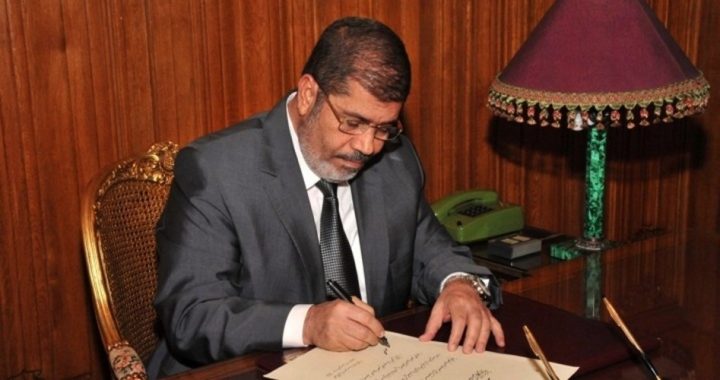
Egyptian voters adopted a big-government constitution in a national plebiscite December 15, and it went into force December 26, according to Reuters wire service. Voters adopted the constitution by a 64-percent popular vote.
“I will make all efforts, together with you, to push forward the economy which faces huge challenges and has great opportunities to grow,” Egyptian President Mohamed Morsi said in an address announcing formal adoption of the constitution.
The new constitution guarantees that the Egyptian government will remain a major force in the lives of Egyptians, with guarantees of government healthcare, education, housing, pensions, food, etc., worthy of any European social welfare state. Article 70 of the lengthy constitution stipulates that:
Every child, from the moment of birth, has the right to a proper name, family care, basic nutrition, shelter, health services, and religious, emotional and cognitive development.
In addition, Article 67 guarantees the same to adults, including, “Adequate housing, clean water and healthy food are given rights.” Elsewhere guarantees, “The State shall provide social insurance services. All citizens unable to support themselves and their families in cases of incapacity, unemployment and old age have the right to social insurance guaranteeing a minimum sustenance.”
The Egyptian constitution requires massive government interference in the economy, promoting a national industrial policy: “National economy shall be organized in accordance with a comprehensive, constant development plan.” And while the constitution nominally prohibits socialism — “Nationalization shall not be allowed” — the prohibition is completely negated with the subsequent phrase: “except for in consideration of public interest in accordance with the law and against fair compensation. ” Government will control businesses, farmers, wage earners, and unions, at least indirectly:
Wages shall be linked to production, bridging income gaps and establishing a minimum wage that would guarantee decent living standards for all citizens.
Industry is an essential asset of the national economy. The State shall protect strategic industries, support industrial development, and import new technologies and their applications. The State shall foster small handicraft industries.
Professional syndicates [unions] are regulated by law and managed on a democratic basis, the accountability of their members subject to professional codes of ethics. One trade union is allowed per profession.
The State shall protect and increase farmland.
On social freedoms, many Westerners are fixated upon Article 2 of the constitution, which claims that “Islam is the religion of the state” and the “Principles of Islamic Sharia are the principal source of legislation.” But this provision does not take any rights away from individual Egyptians. The Egyptian constitution nominally protects individual rights, stating that “Freedom of the press, printing, publication and mass media shall be guaranteed.” And:
Freedom of belief is an inviolable right. The State shall guarantee the freedom to practice religious rites and to establish places of worship for the divine religions, as regulated by law…. The canon principles of Egyptian Christians and Jews are the main source of legislation for their personal status laws, religious affairs, and the selection of their spiritual leaders.
However, these nominal guarantees of the rights to freedom of speech, press, and religion appear to be negated by Article 44 of the constitution:
Insult or abuse of all religious messengers and prophets shall be prohibited.
“Insulting the prophet” Mohammad is a vaguely defined crime historically employed by many Islamic states to persecute non-Muslims who simply publicly disagree with certain Islamic religious principles.
The press is also to be controlled through an Economic and Social Council with a government National Media Council:
The National Media Council regulates the affairs of radio, television, and printed and digital press, among others. The Council shall ensure the freedom of media in all its forms, safeguard plurality, fight centralization and monopoly, protect the interests of the public, and establish controls and regulations ensuring the commitment of media to adhere to professional and ethical standards, to preserve the Arabic language, and to observe the values and constructive traditions of society.
While the Egyptian constitution does provide for separation of powers, extraordinary powers are reserved to the president, who can dissolve the House of Representatives and call for new elections on a whim. Nor are there any principles of federalism embedded in the constitution, with a national police force and national military conscription required in the text.
While Egypt has passed from a dictatorship to a state with elected representatives, its new constitution is only a small improvement over the old dictatorship.
Photo of Egyptian President Mohammed Morsi signing Egypt’s new constitution into law: AP Images



